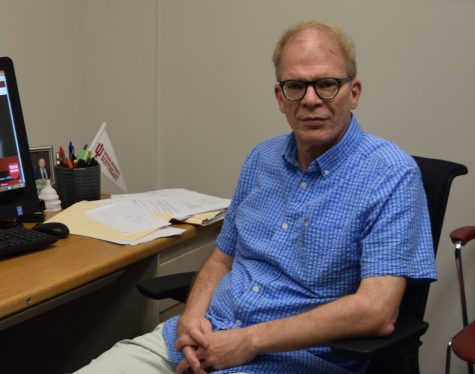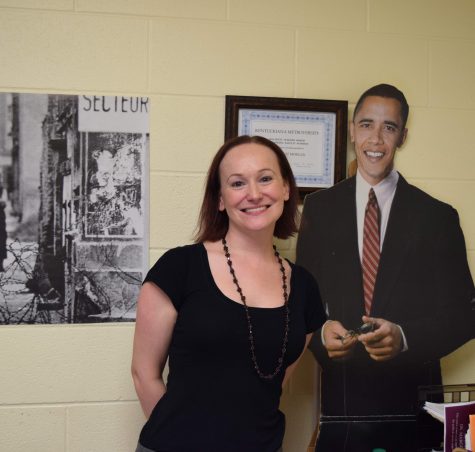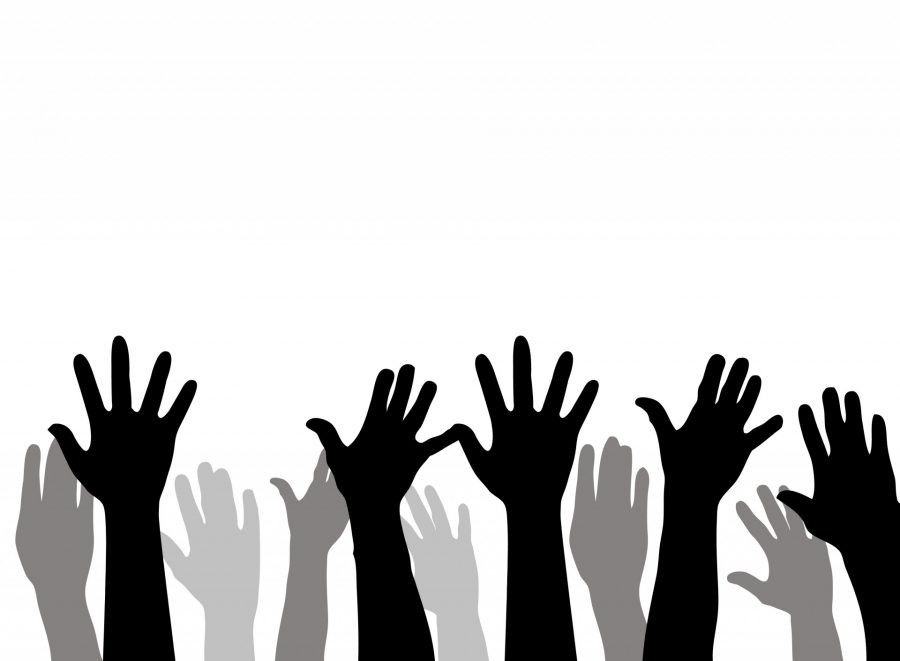The Importance of Voting
October 17, 2016
With many Americans caught in a political tug of war over which is the worst candidate in the upcoming presidential election, it would appear our nation’s youngest and newest potential voters are wading into murky waters when it comes to their first opportunity to vote in a presidential election.
It has left many asking themselves why they should vote at all when they cannot bring themselves to align or relate to the primary candidates on the ballot.
Others may not vote simply because they have not yet figured out how politics impact our everyday lives or how important their right to vote is.
Joe Wert, associate professor of political science, said it is a person’s civic duty to vote if they have the ability to do so.
“In so much of the world today people do not have the right to vote,” Wert said. “In countries where the right to vote is widespread, it is a civic duty to practice that right.”
Wert said the act of voting is imperative as it helps to determine the direction our country is going to take whether it be voting in the local city wide elections or up through the national elections.
He said both presidential and state elections are critical because in our system of separation of powers there is not a lot that the president can do without congressional action and there is not a whole lot that congress can do without presidential action.

“[Those elections] are both very important particularly in this election because this time we have the supreme court in play as well. We have an opening on the Supreme Court with the death of Antonin Scalia,” Wert said. “One of the first things the president is going to do is to select a nominee for that position. Whoever becomes president is going to potentially direct the course of the supreme court for decades to come.”
Wert said since the early 1980s there has been an ideological balance to the supreme court. He said there were four justices that typically voted conservatively, four justices who typically voted liberally and one justice who acted as the swing vote.
Wert said Sandra Day O’Connor was the swing vote until she retired and now Justice Kennedy assumes that role. He said Scalia was probably the most conservative justice sitting on the court.
Unless the new president’s nominee is a conservative, Wert said that we will see a significant shift to the left in the Supreme Court.
With the amount of dissatisfaction for the nominees of both the Democratic and Republican parties, there are many who are considering casting a protest vote. This would mean voting for independent candidates outside of the two party system.
Margot Morgan, assistant professor of political science, said that practically and mathematically speaking if you vote for the Libertarian or Green party then your vote doesn’t have the same impact as it would otherwise.

She said this is because, technically speaking, you are not picking the winner. Even if that candidate gets a lot of the popular vote, the chances are very slim that they will get the vote of the Electoral College. Despite it not being the most effective way to vote she believes that protest votes are important in their own right.
“I think it is important for people to vote symbolically,” Morgan said. “Symbolically with their vote, [they say], ‘I care about this country, I care about this system, and I don’t like what is on the table, so I am going to vote for one of these other parties to demonstrate my love for democracy and to demonstrate that I think we are on the wrong track.’”
Even if you do not like the options for president, Kailey Coursey, president of the IU Southeast College Democrats, said she wants voters to realize that there is more at stake then the presidency.
“It is not just a presidential ticket this year. There are state representatives, judges and senate seats that are open as well,” Coursey said. “It is all very important. It affects our everyday lives.”
Morgan agrees with Coursey in regards to the president not being the only significant vote on the ballot.
“Local politics is really where it is at, because all these congress people start out somewhere. They start out in the local precincts. They start out running for city council or for mayor,” Morgan said. “That is our opportunity because our votes really do count at the local level. That is our opportunity to create the next group of politicians that is going to rise up.”
Morgan said who we vote for at the local levels sets the tone for what happens at the state and national levels.
She said there has been such a stalemate in congress right now that congress has been unable to get anything done.
“When you have congress controlled by one party and the president controlled by another party very little gets done,” Morgan said. “If you are strongly republican or strongly democratic it matters a lot who you vote for senate, because that can shift who takes control of the senate.”
She said the democrats can’t take back the House but they could take back the Senate.
“If we have Donald Trump in the White House, a republican controlled Congress, a republican controlled Senate, and a republican controlled Supreme Court, they are going to sweep it,” Morgan said.
She said even if you are undecided you have to think about what kind of future you want.
Roger Howard, Chair of the IU Southeast College Republicans, said one of the biggest reasons to vote is that it makes our democracy work.

“Without the majority vote you don’t have a true representation of the democracy,” Howard said.
Howard said a lot of the time millennials and the younger generations don’t vote and are overshadowed by the older generations.
“We are the largest voting bloc now,” Coursey said. “We can turn an election if we want to.”
Thom File, author of “Young Adult Voting: An analysis of Presidential Elections 1964-2012,” an article featured on the U.S. Census Bureau’s website in April 2014, summarized some voting trends that correlate to voter age groups.
File wrote that since 1964, young voters between the ages of 18 through 24, have consistently voted at lower rates than all other age groups.
“Overall, America’s youngest voters have moved towards less engagement over time as 18 through 24-year-olds voting rates dro pped from 50.9 percent in 1964 to 38.0 percent in 2012,” File wrote. “Older Americans [60 years and older] showed an overall voting rate increase between 1964 and 2012 (66.3 percent to 69.7 percent), surpassing the rates of all other age groups.”
His article was based on statistics taken from the Census Bureau’s past and current population surveys. To give a better view of the age groups and the percent of votes they account for, he gathered the following statistics from 2012.
* The percentage of eligible voters between the ages of 18-29 accounted for 21.2 percent of the potential electorate and yet the age group only accounted for 15.4 percent of actual votes.
* The percentage of eligible voters between the ages of 30-44 accounted for 24.0 percent of the potential electorate and the age group accounted for 23.1 percent of actual votes.
* The percentage of eligible voters between the ages of 45-60 accounted for 35.6 percent of the potential electorate and they accounted for 39.1 percent of actual votes.
* The percentage of eligible voters 60 years and older accounted for 19.1 percent of the potential electorate and accounted for 22.34 percent of actual votes.
“If we really want to change our futures it starts with our votes now,” Howard said.
Coursey and Howard, along with their organizations, recently held a voter-registration drive on campus from Oct. 5, 2016 through Oct. 6, 2016. They helped over forty students to either register to vote, confirm their registration or find their polling location.
Coursey said some of the main goals of the College Democrats and the College Republicans are to serve as extensions of the parties on campus, to help students with political internships and voter education.
Even though the organizations represent two very different platforms, Coursey said they are more than capable of working together for the sake of helping and encouraging students to get out and vote.
“We can have agreements and disagreements. It is not about being completely against one another,” Coursey said. “We are all in this together.”
For information on how to register, where your polling station is, exactly who is on your ballot and all the positions up for re-election, you can visit the Secretary of State’s website for your respective state.
For Indiana residents you can find information from the Indiana Statewide Voter Registration System. For Kentucky residents you can find information from the Kentucky State Board of Elections.
There are many things to consider before voting and these websites are a starting place for becoming better informed before Election Day.
“If we had higher voter participation we would start to see gridlocks disappear,” Howard said. “I believe we truly do have a voice in how our country is run and the future… That is why I value my right to vote.”


